I tried all my tricks.
I leaned my ear in close while opening and closing the valve: no sound. I hovered the lighter’s flame near the brass attachments: no flame. I unscrewed each attachment and checked the tines weren’t bent. I re-screwed tightly, making sure not to overscrew. I checked the threads for sand and, seeing none, blew on them anyway. At this point, I had maxed out my stove repair skills, so in a Hail Mary approximation, I whispered “Please work,” eight times in a row. I tried again to light the stove. It did not light.
This was night one on the Lower Owyhee. Perhaps the sunbrella and beach emoticon Casey labeled the pre-trip group chat with was misleading. Perhaps it was just optimistic. It was May, after all. Casey and Mika were excited to introduce two coworkers to their first-ever river trip.
So far, it was not panning out as advertised. The unfavorable conditions included a wind advisory and a rainstorm. Gale-force winds whipped water violently off whitecaps. The upstream gusts were comically unceasing. Rogue waves as big as ocean swells peppered the first eight miles of flatwater. I tried to ignore the swelling blister on my palm.
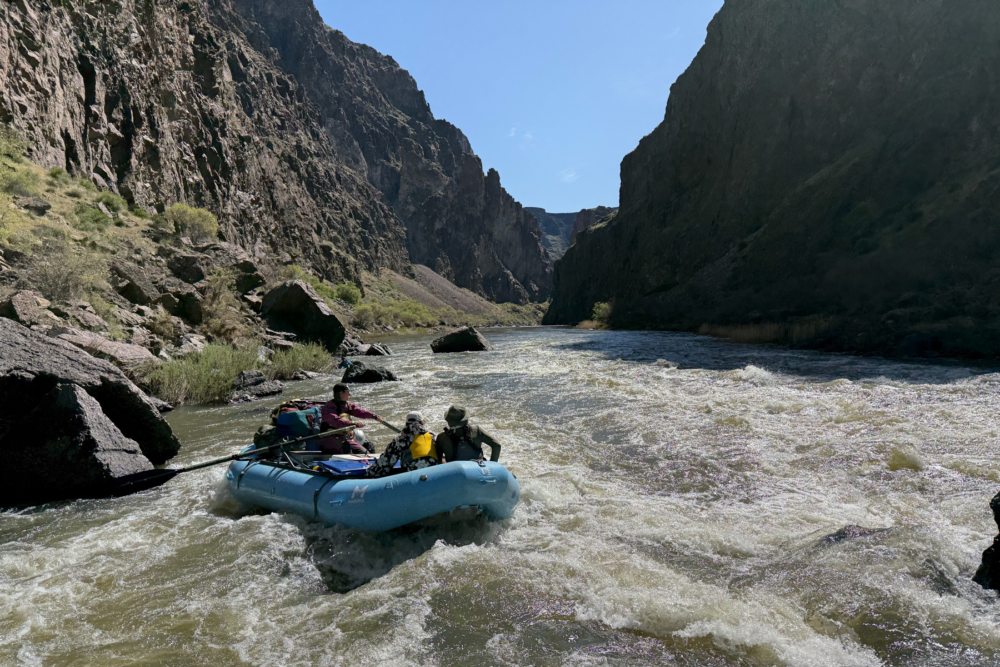
The Owyhee Canyonlands are a place that have never, not once, been normal for me. This piece of public land is wild, remote, and wonderfully fickle. When I recreate there, something almost always goes wrong. Our gazetteer doesn’t match Google Maps, and neither map—digital or paper—matches the actual roads.
Once, we got high-centered in a mud puddle. We spent three hours up to our armpits digging ourselves out, all to the soundtrack of pooping cows. Another time, in the same area, at the same time of year, we got high-centered on snow. There have been times I am so hot it feels dangerous to leave my full-body submersion. But then again, at the same time of year, we had to pour boiling water on our frozen shoes just to loosen the laces enough to slip our feet inside. Both high and low water conditions have thwarted expeditions. The Owyhee Canyonlands have bested me more than once, but I love them even more for it.
If the conditions are right, the Lower Owyhee River is actually a relatively accessible stretch through an otherwise remote and undeveloped area. Usually, the toughest part is the Birch Creek Take Out road, which can wash out with heavy rains. (I avoid thinking about one particular drive out). If there’s rain in the forecast, some people opt to take out at Leslie Gulch instead. Depending on how full the reservoir is, this option involves about 13 miles of deadwater. You can bring your own motor, or hire a tow. On this particular trip, the Birch Creek road was reportedly in rough shape. We booked our shuttle to Leslie when Mika procured a propane-powered motor for us to borrow.
Mika, Casey and I wanted to make sure that Zach and Marie had a good time on their first river trip. When we arrived late at camp after only managing to row nine out of our scheduled 17 miles that day, I went into overdrive.
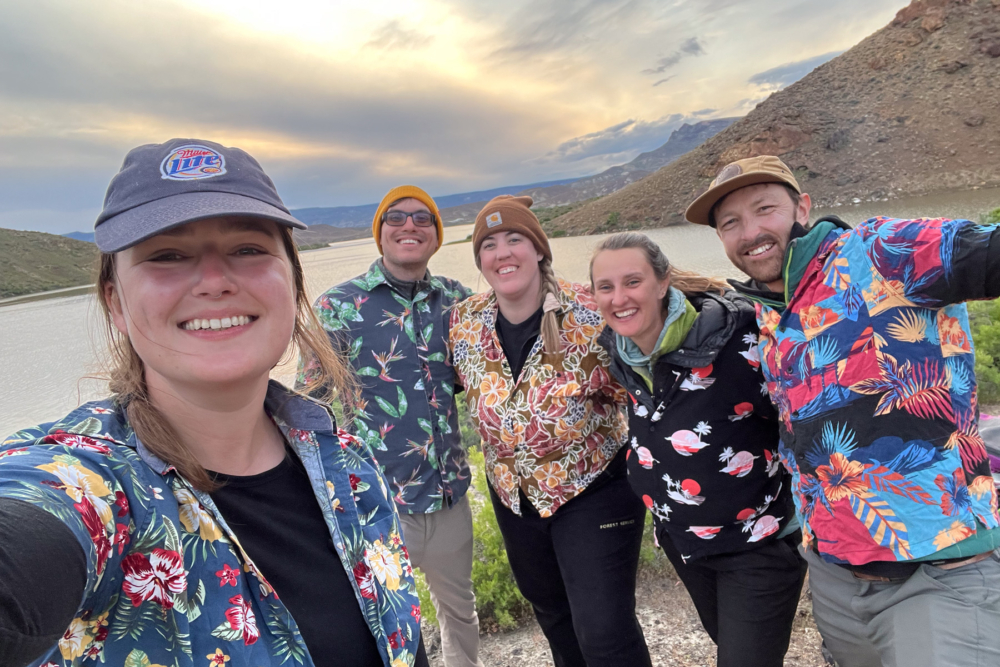
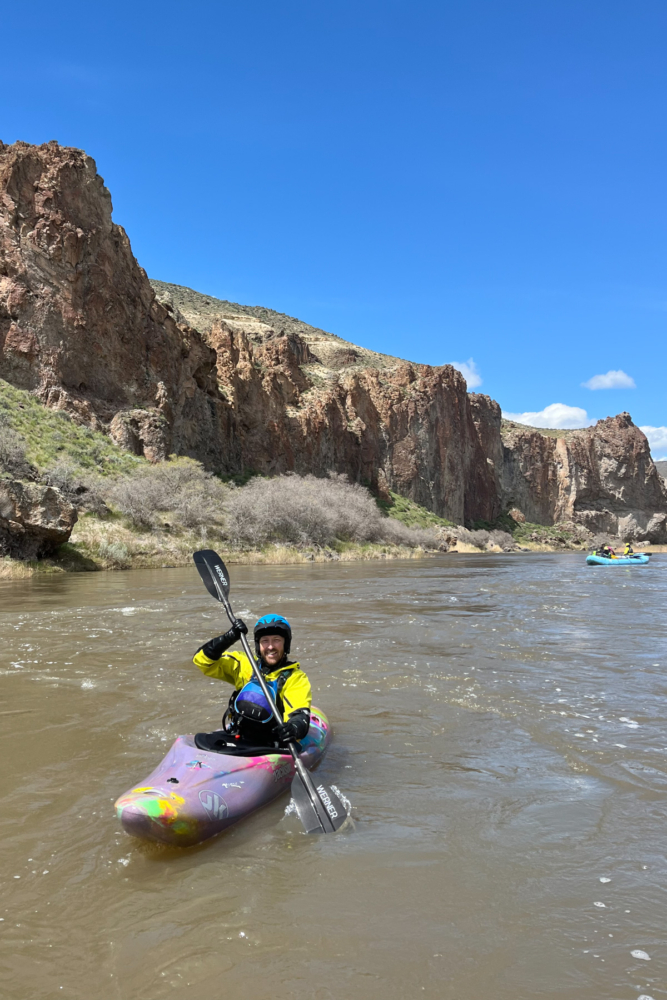
“I got kitchen. I’ll boil some water for hot drinks.” I shooed my partner, Casey, towards one of his shivering friends, knowing he’d help with tent setup and extra warm layers as needed. We had clawed our way through those nine miles. It was cold, it was wet, it was windy, still. I was trying not to think about making up miles; I just wanted to get everyone’s spirits up with some hot cocoa.
Still clad in my dry suit and PFD, I did five squats, blew air into my cupped hands, and opened the dry box. I hung the dish rack, set up the handwashing station and attached the stove hose to the propane tank. I filled a pot with water.
That’s when the stove failed me.
“Ummm,” eyes wide, slightly panicked, I grabbed Casey’s arm as he walked by the kitchen. “I can’t get the stove to work.” I traded his armful of firewood for my lighter and headed to the firepan. Mika joined Casey in the kitchen. With the methodical and precise motions of two ICU nurses, they diagnosed the issue: the propane valve was broken.
“I just got this tank! It’s brand new,” Mika lamented.
“Really?” I asked, eyeing the faded and torn label.
“I mean, I exchanged my empty for a full one, right before the trip,” she said, with incredulity.
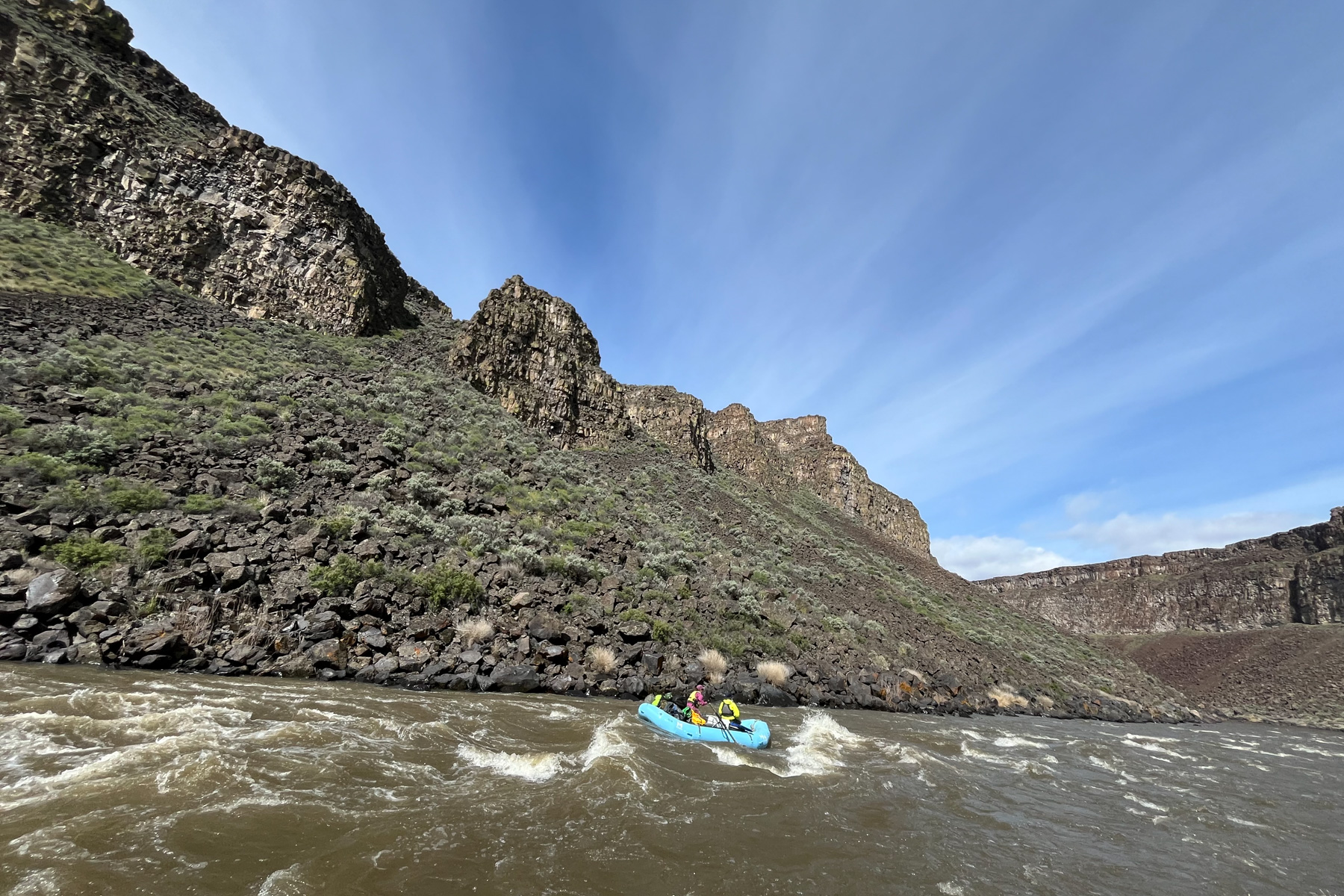 “It’s fine! It’s fine,” I pepped. I started running through our list of meals and mentally planning small adjustments. “We’ve got a firepan, we’ve got a dutch oven. We can make this work!”
“It’s fine! It’s fine,” I pepped. I started running through our list of meals and mentally planning small adjustments. “We’ve got a firepan, we’ve got a dutch oven. We can make this work!”
Mika leveled me with a gaze; “The motor,” she said gravely.
“The motor,” I repeated, the implication dawning on me. We had 59 miles to go and two and a half days to do it. Which would have been fine, except we had to be at the take-out early (night nurses need naps before work). And 13 miles of that would have exactly zero downstream current. As if to reiterate the dire nature of the situation, the wind made a gallant surge, flipping two camp chairs and teetering the table dangerously.
“Okay, okay,” I grasped for a positive spin while Mika and Casey did some quick math. We needed to row 34 miles the next day. Oh. Did I mention the water level was hovering just below 1,000 CFS? Biting back my groan, I glared at the propane tank.
“Wait. What’s that say?” I indicated words in faded black Sharpie. Bad val was just legible.
Mika barked out a laugh. “Well, we rowed all day into incessant wind, but at least our propane tank has a bad val.”
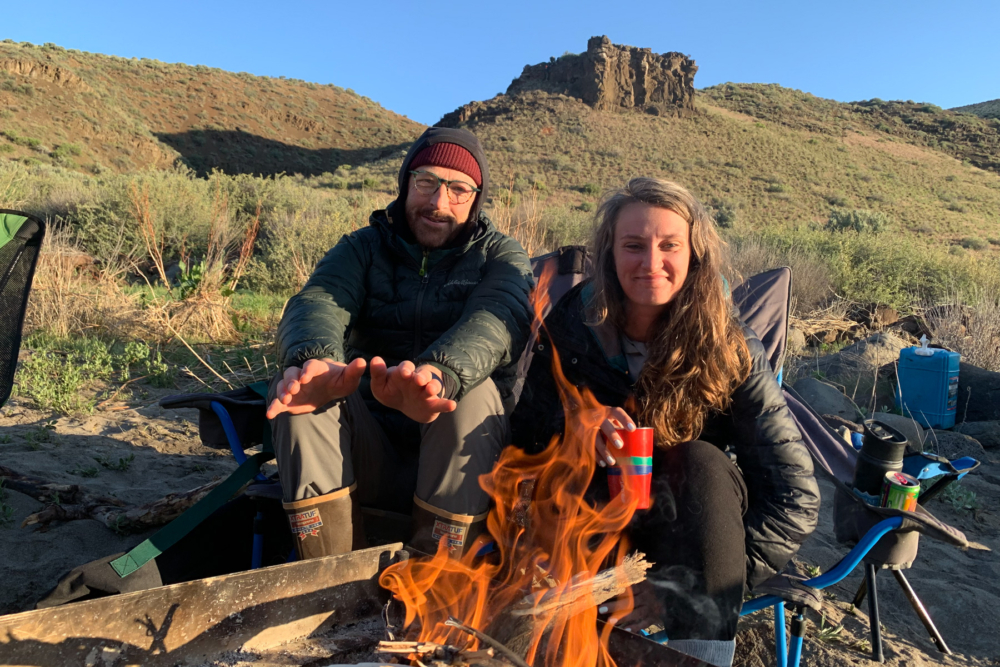
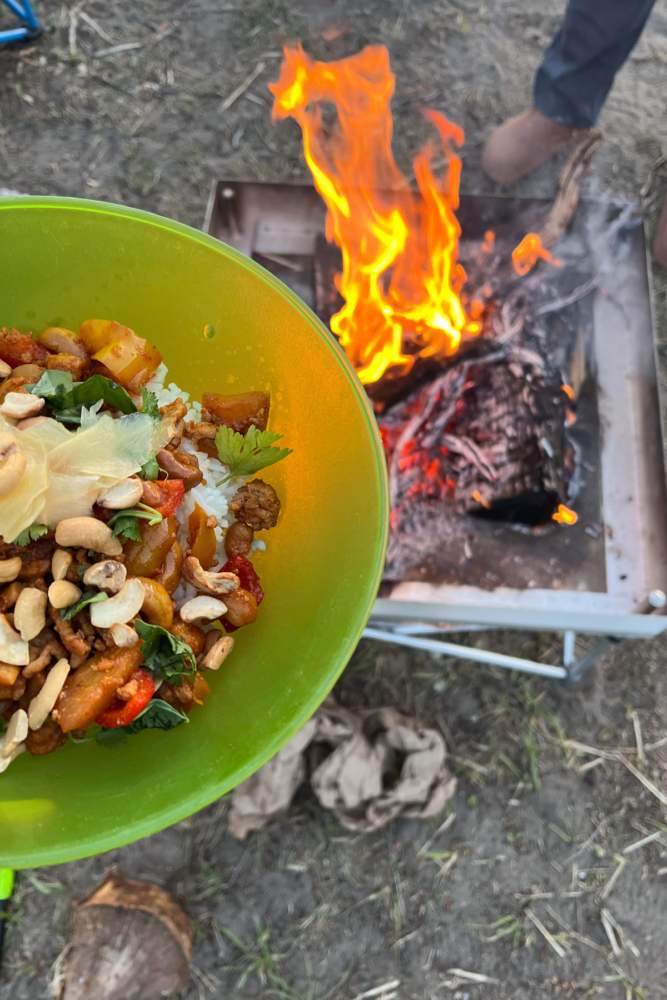
My English teachers lectured me not to use double negatives, but the math teachers may have had it right this time. For some reason, two negatives just added up to a positive.
“Our propane tank doesn’t work, but at least our firewood is wet,” Zach added.
“It took us seven hours to row nine miles, but at least the carry to our campsite was muddy and steep,” I joined in. Our laughter lightened the mood.
The next morning was frosty. Of course. I had to dig past my Hawaiian shirt to find my mittens. Over breakfast, Casey intoned, “We have to row 34 miles today, but at least all our water froze overnight.” We cracked the layer of ice on our dish buckets with a dead blow hammer, then decided breakfast dishes could wait. The sun was shining and the air was surprisingly calm: we needed to capitalize.
We pushed hard while favorable conditions were present. That didn’t last long, because, remember, the Owyhee isn’t sane. What was sunny blue skies above Montgomery rapid was hail below it.
Mika, whom I had affectionately started referring to as Bad Val, stood up at the oars, pushing wildly. “We have to row 34 miles on this slow-moving river,” and with a mighty crescendo, she yelled, “but at least it’s hailing!”
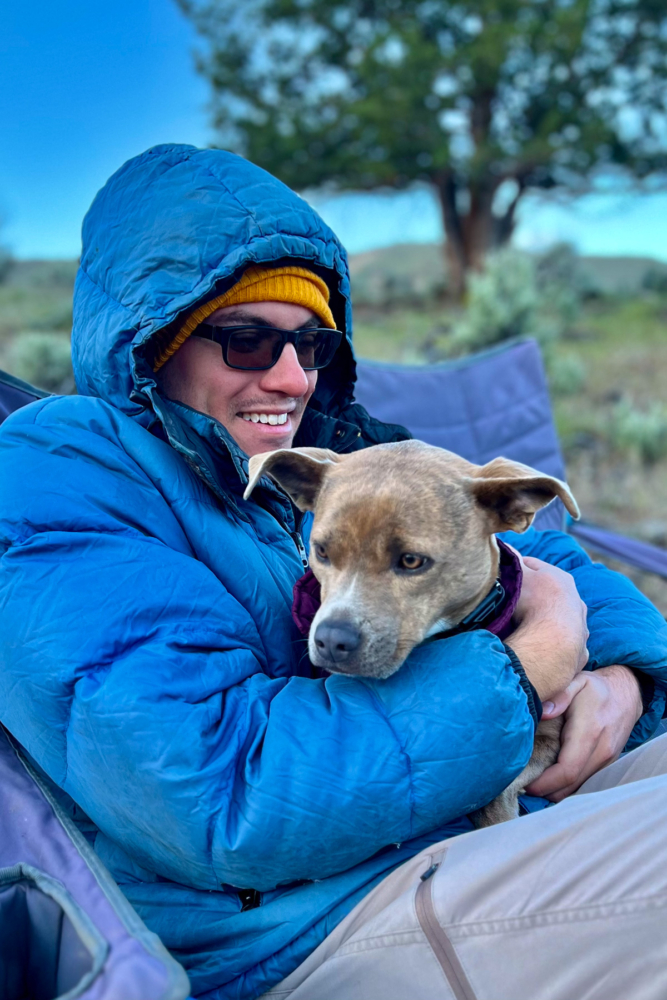
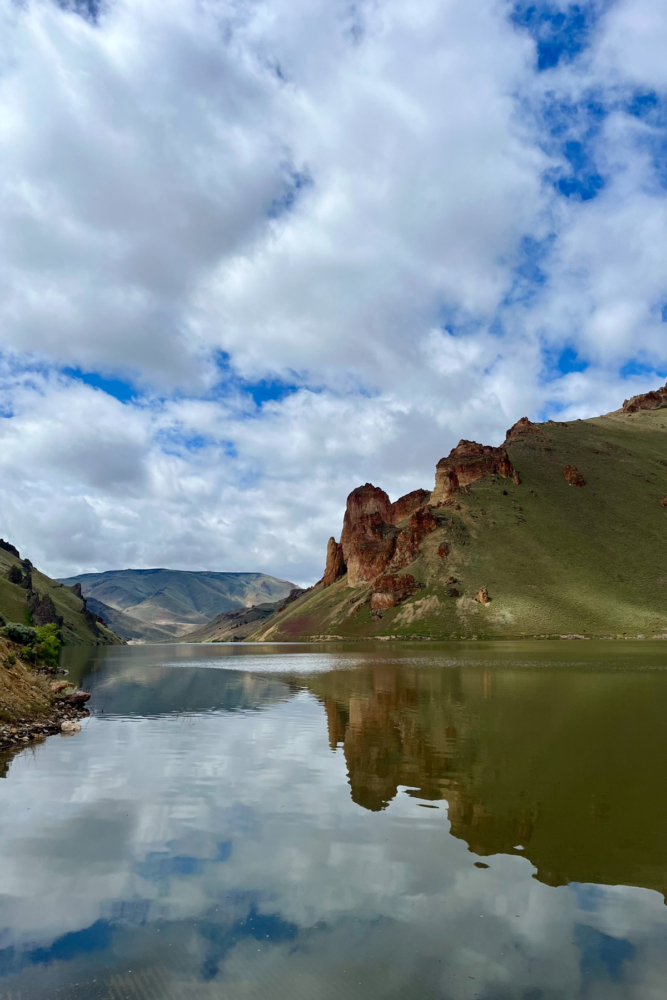
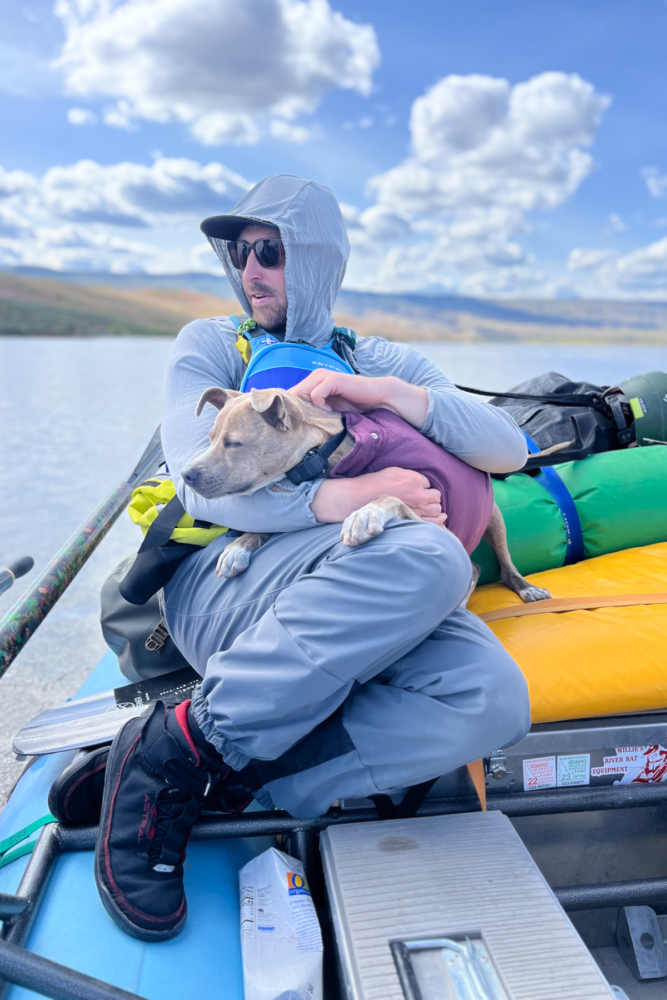
There were a few more snow flurries and some rain, but we kept our spirits up by envisioning the hot springs on the reservoir. And by scheming about how to bum a propane tank from another group. Turns out, we pushed so hard, we pushed past every other group on the water. With 20 miles to make, and over half of them on the lake, we couldn’t afford to wait at Birch Creek to make a trade.
We peeled out of the empty take-out into the already waning current. Mika muttered, “The propane tank is broken, but at least I get to rig this heavy, awkward, useless motor every day.”
When we lost the current fully, we strapped our rafts together and party barged. We took turns on the oars, traded DJ duties, told stories and soaked up the suddenly shining sun. We startled a flock of pelicans, who soared away directly overhead. It was a long day of flatwater, and of course, the carry was steep, but at least the hot springs were waiting for our tired muscles. We got camp set up, and Marie peeked her head above the rise.
“Well,” she turned slowly back to us, “We rowed 13 miles of flatwater into the wind, but at least the hot springs are fully occupied.”
We laughed. Of course they were.
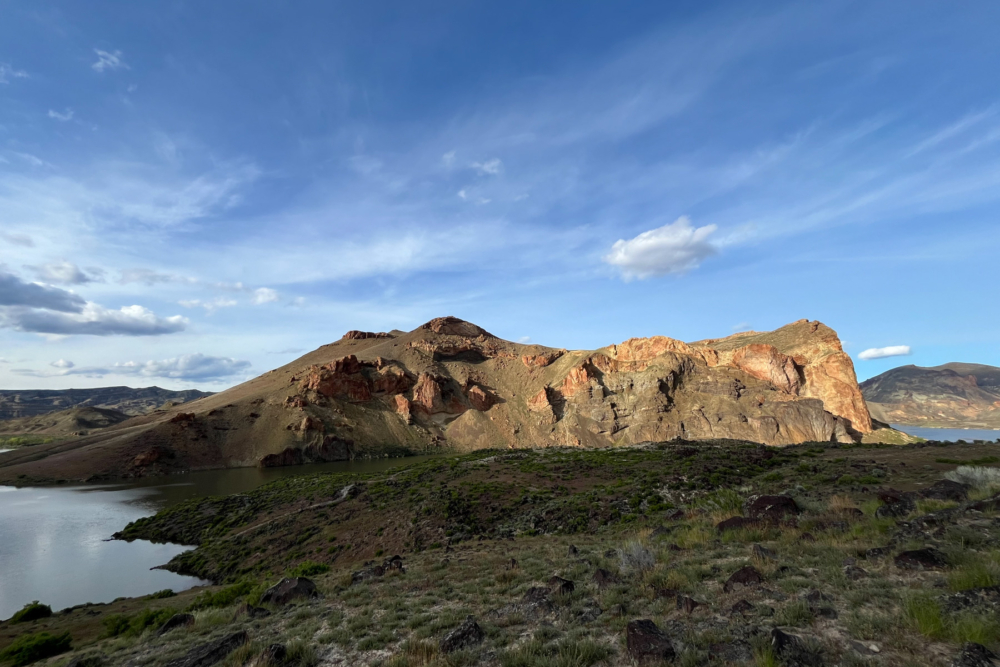
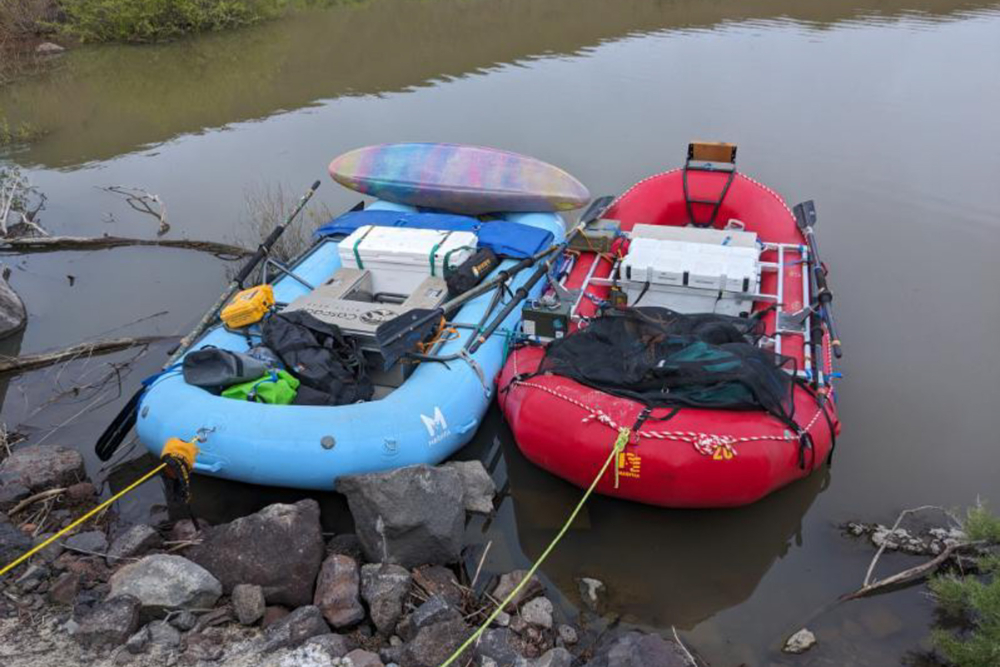
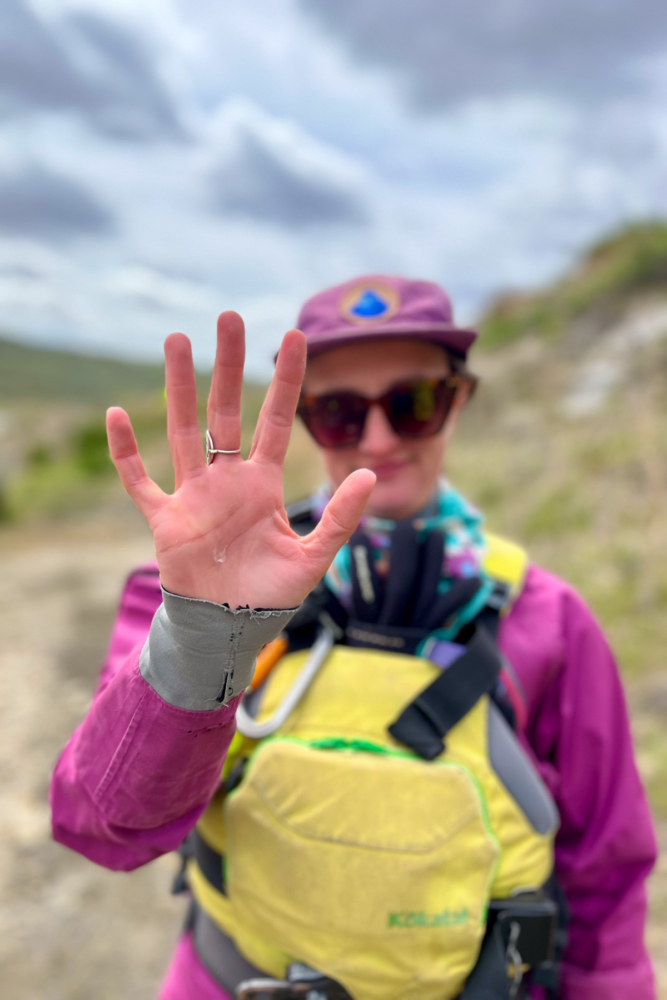
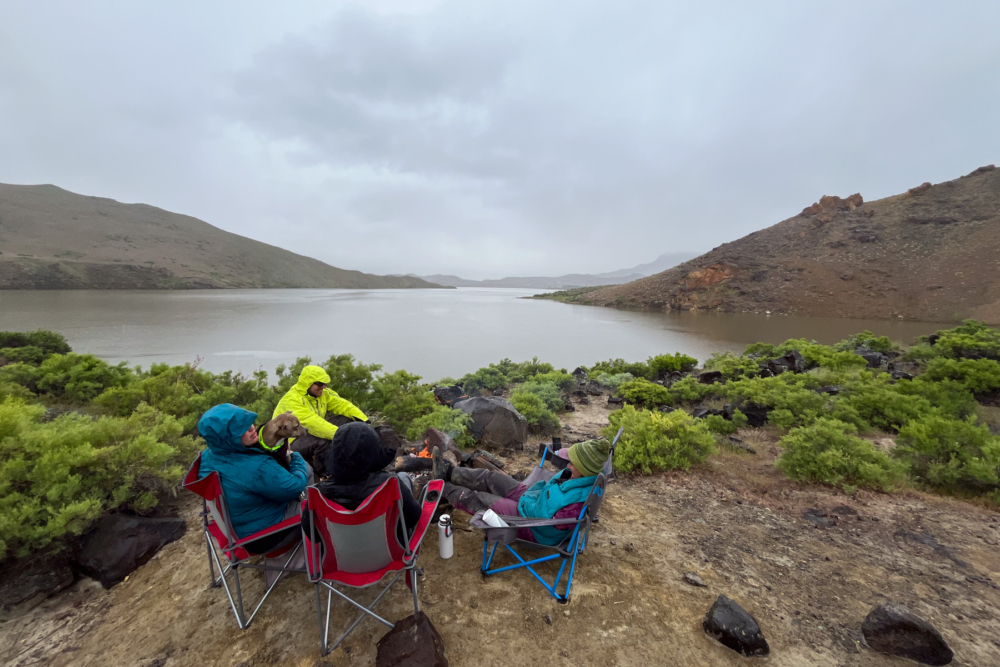
But the thing about the Owyhee, and the wilderness in general, is: anything can happen. And when you have an extra six-pack of Modelos and a bag of Skittles with which to bribe a pair of fishermen leaving the hot springs, truly anything can happen.
That’s how we found ourselves packed up and river-ready, sitting in a circle around an unlit fire pit, in the pouring rain. The fishermen promised to give us a tow. They said they’d be back between 10 and 11 am. By 9:50, we had strapped our boats together and built a self-equalizing anchor. We were not making our rescuers wait one single minute. We passed the time spit-balling double negatives from our trip and giggling.
Our rescuers arrived at 10:37 am. They met our shades of neon GORE-TEX® with jeans and cotton hoodies. They met our self-equalizing anchor with a double overhand knot. And they refused the cash we offered as a thank you. So, we kicked back and relaxed, fully consumed with gratitude and delight.
The Owyhee Canyonlands once again refused to be anything but what they are: stunning and capricious. All we had to do about the latter was double the negatives. It laced each curveball with humor.
We weren’t bested by the Owyhee this time. Turns out, all we needed was the right math equation.
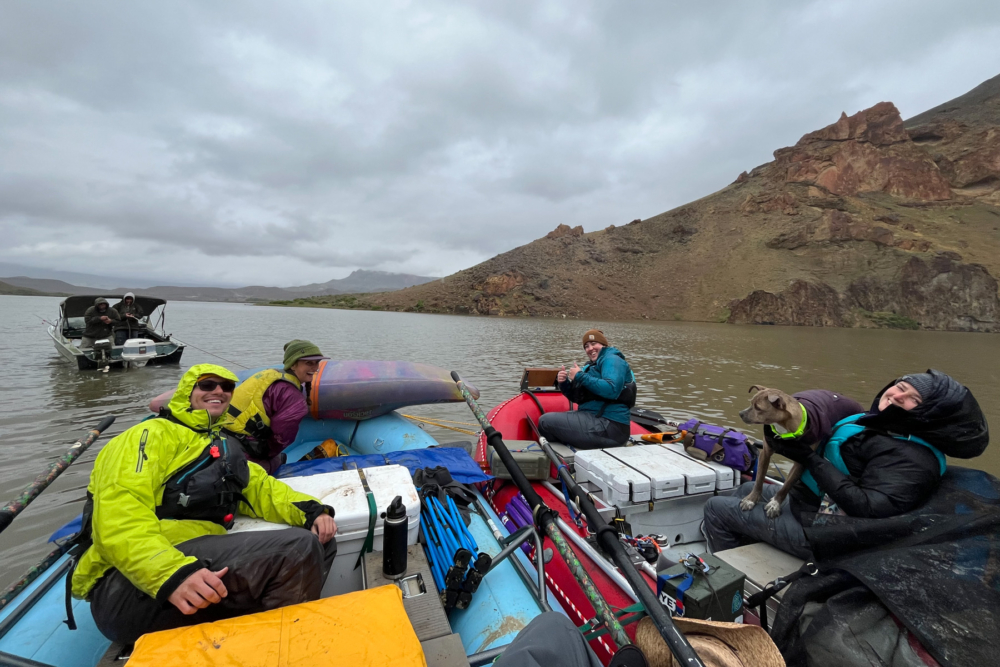
***